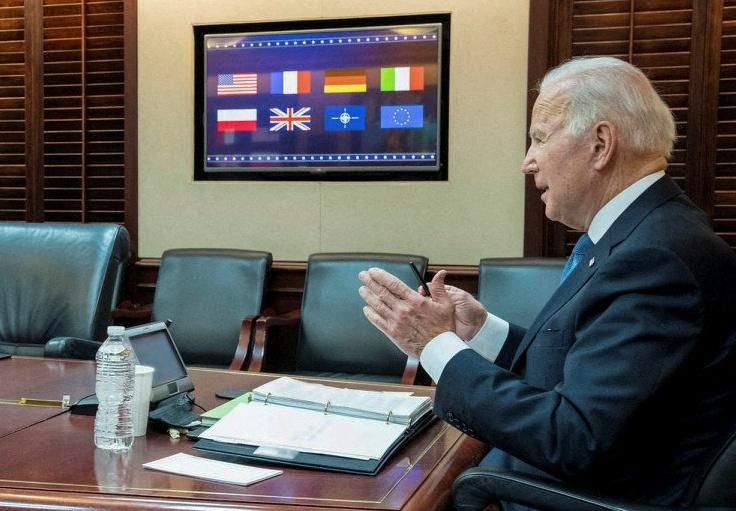January 25, 2022
Western powers claim that they present a united front against the Kremlin’s current threats in Ukraine. But clearly there are reasons for doubt. President Joe Biden provided more last week when he appeared to question whether NATO would in fact act with “total unity” if Vladimir Putin orders Russian troops across the Ukrainian border.
Do Western allies really agree on a common approach to keeping Russia out of Ukraine? What are the major points of contention among them?
On the economic front, the US is prepared to go big: the White House has been pushing for tougher economic sanctions if the Kremlin encroaches on Ukraine’s sovereignty, including by cracking down on both Russian financial institutions and international entities that lend Russia money. It also has more than 8,500 troops ready to move into Eastern Europe if Russia escalates.
But Europe’s reliance on Russian natural gas is undermining efforts to present a united Western front against Russian aggression.
Germany. While some Western governments have sent defensive arms to Ukraine, Berlin has so far refused. It argues that arming Kyiv would encourage both Ukraine and Russia to escalate the conflict. Germany is not only reluctant to send weapons to Ukraine, but it has also scuttled attempts by NATO states, like Estonia, to deliver German-made arms to Ukraine. (Berlin retains some authorization rights over exports of their weapons.) Germany has also refused to back a proposal to cut Moscow off from the global electronic-payment system known as SWIFT.
Facing criticism, Germany’s new government has said that the country’s reluctance to arm the Ukrainians is in part the result of its pacifist foreign policy – an approach required by Germany’s militarist past. But analysts say that German reliance on Russian natural gas – which accounts for half of all its gas imports – better explains Berlin’s hesitancy to draw the Kremlin’s ire.
France. French President Emmanuel Macron is capitalizing on the sense of urgency – and division – to assert himself as Angela Merkel’s replacement as the leader of Europe. Macron has been talking tough on Russia – saying preemptive sanctions are on the table to deter a Russian incursion – while also calling for more diplomacy. Moreover, Macron, who has long advocated for European strategic autonomy, has called for a united Europe to engage with Russia separately from the broader US-NATO dialogue. (On Wednesday, Paris is hosting a group of Ukrainian, Russian, French, and German officials to try to chart a path forward.)
The UK. London has traditionally positioned itself as a “bridge nation” between the European Union and the United States, particularly when US presidents and European leaders have clashed on big geopolitical issues. Though this dynamic has changed since Britain left the EU, the UK is still a powerful NATO player with a lot of strategic leverage. As Putin continues to build up Russia’s military presence on the Ukrainian border, London has aligned closely with Washington, sending more than 2,000 short-range anti-tank missiles to Ukraine in recent days and calling for an “unprecedented package of sanctions.” Indeed, the stakes are lower for London, which gets most of its natural gas imports from Qatar and the US.
The Qatari wildcard. The Biden administration is reportedly in talks with the Qataris, global liquified natural gas heavyweights, to increase supplies to Europe in the event that Russia invades Ukraine.
However, rerouting supply routes is no small feat, particularly because more than 80 percent of Qatari gas is currently tied up in contracts with Asian states. But Eurasia Group analyst Raad Alkadiri says the US plan could work, particularly if it means the Qataris get premium prices for their exports and get to play a more consequential role in geopolitics. Still, Europe is already facing tight gas markets, and it needs to ensure available and secure supplies. At the moment, a lot of it comes from Russia.
In sum, the leaders of NATO countries will continue to insist that they speak with a single voice on questions of Ukraine’s sovereignty and the consequences of potential Russian aggression. But Vladimir Putin has good reason to wonder whether that’s true.More For You
- YouTube
In this Quick Take, Ian Bremmer breaks down the growing tensions between the US and Iran, calling it "the next area of potential large-scale conflict where President Trump is interested in changing the facts on the ground."
Most Popular
A flood victim stands at her flooded home after weeks of heavy rainfall in Boane District, Maputo, Mozambique, January 19, 2026.
REUTERS/Amilton Neves/File Photo
392,000: The estimated number of people displaced across Mozambique by recent rain-induced floods. Severe flooding in the southern African nation, as well as in South Africa and Zimbabwe, has killed over 100 people.
© 2025 GZERO Media. All Rights Reserved | A Eurasia Group media company.
